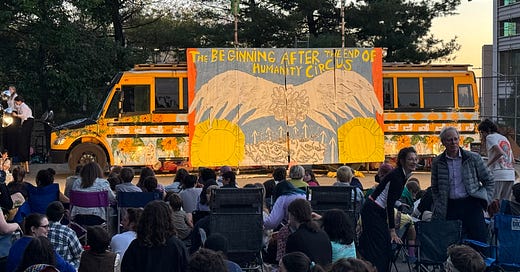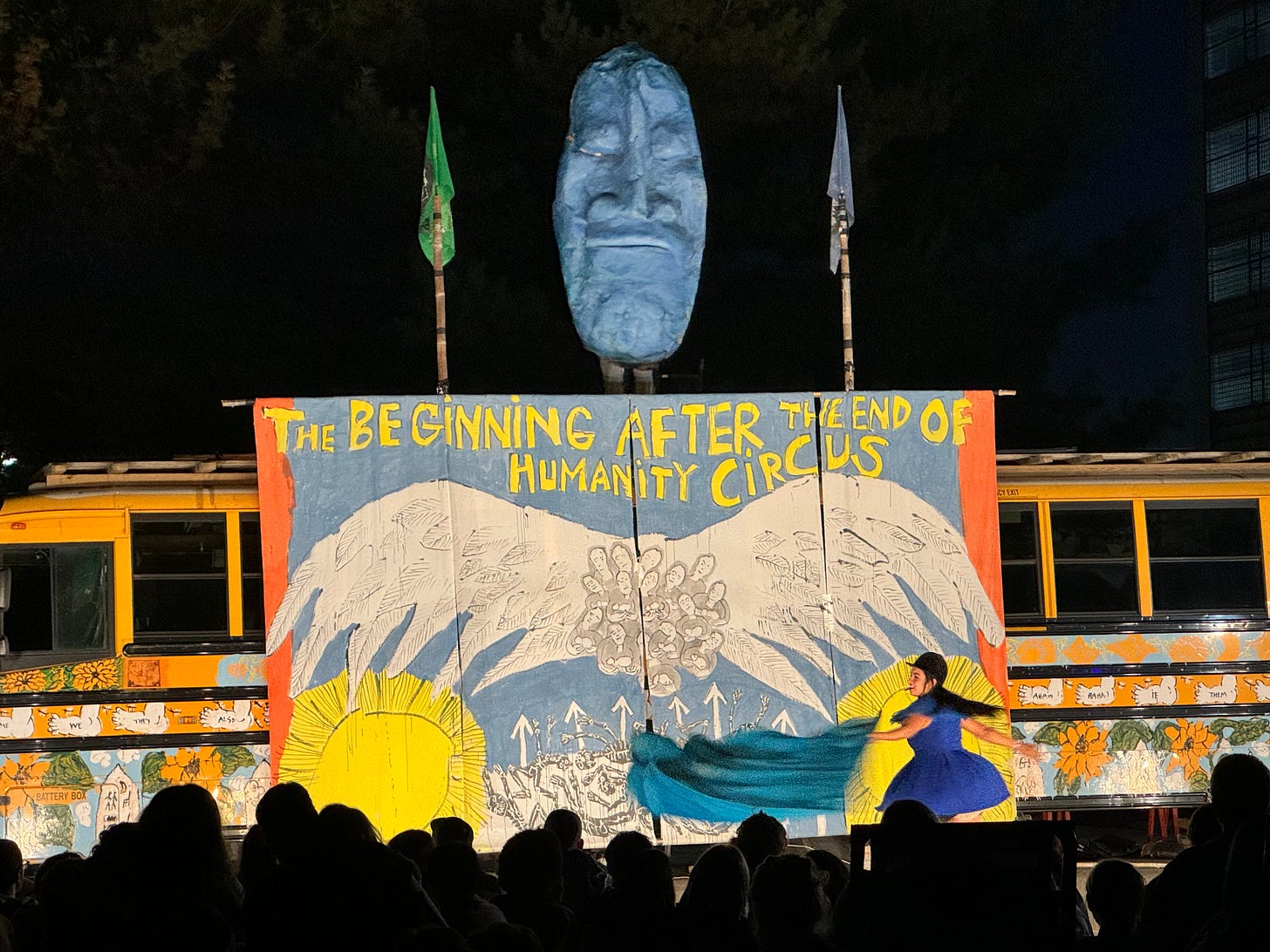The Terrors of War and the Joy of the Circus
A look at Bread & Puppet Theater's one-night only performance in Pittsburgh
We were all groundings as the flower-power children of a bygone era rolled into town. A yellow school bus covered in sunflowers and mid-flight doves dredged its archaic body onto the blacktop, immediately transforming the decaying basketball courts of a nearby grade school into a one-night haven for local misfits of every living generation.
Armed with 15-feet-tall rod puppets, oversized papier-mâché heads and a roaring brass band, Bread and Puppet Theater descended upon Pittsburgh for a lone performance of their original work “The Beginning After the End of Humanity Circus.”
Since its inception in 1963 by Peter Schumann, Bread and Puppet has carried on the bohemian tradition as a roving political theater company. Despite its rise in prominence during the Vietnam War era, Schumann helms the company with current productions steeped in modern political discourse surrounding the war in Gaza.
The danger of political theater is that it can quickly devolve into the scripted slogans, campaign cliches and partisan peacocking intrinsic to modern American politics. Yet Bread and Puppet Theater emanates an air of political earnestness without sinking into petulant, nihilistic angst (vis a vis SNL’s “High School Theater Production” skits). Somehow the cast makes international headlines and debate talking points feel personal and deeply intimate, a refreshing experience when the political sphere can feel like a carousel of nameless, faceless suffering.
The entire production echoed the medieval, with its cheery band of traveling players and every character, an Everyman. And for just over an hour in the late fall twilight, the troupe invited us to dance in the ever-shrinking chasm between Hellmouth and Heavensgate.
In the opening vignette, we saw a large puppet labeled “Empire” (another nod to the medieval morality plays) wreak havoc on society. It trounced and tortured everything in its path. When all hope seemed lost, a flying pig puppet, complete with sparkling wings, slayed Empire with a cartoonish sneeze, a symbol of whimsy and the impossible. Empire was mourned only by a chorus of corporate goons, labeled Amazon, Nestle and the like.
Poignant political critiques like the death of Empire were seamlessly spliced with jubilant puppet and performer reimaginings of traditional circus acts. A sextet of papier-mâché-headed dancers (the “Pink Ladies of the circus”) sashayed onto the stage with the giddiness of can-can dancers at the Moulin Rouge. The leader of the Pink Ladies announced to the crowd that her gaggle of towering fuschia puppets were “urgently needed for silliness, which is an underused tool for seriousness,”–an apt thesis for the show at large. The line between the horrors of war and the unbridled joy of the circus is usually quite stark, but the Bread and Puppet troupe erases the line and dances across it with the skill of the most veteran storytellers.
A later vignette featured performers carrying massive banners depicting anthropomorphic trees writhing in anguish, known as “the screaming trees.” The players ushered a tattered puppet of mother and child center stage. Another player entered with a model airplane, noticeably smaller than the screaming trees and mother with child. The plane, described as a U.S. Model F15 fighter jet, was carried across the stage as the ensemble let out a haunting whistle that mimicked the sound of a bomb falling from otherworldly heights to the unknowing city-dwellers thousands of feet below. In the pregnant silence after the bomb dropped, a child from the audience called out “I’m cold,” and a shiver shot down all our spines. Without glancing at each other, we knew the child calling out in the early fall twilight spoke for the children we couldn't hear on the other side of the world for whom winter was fast approaching.
As the tragedy of the performance intensified, so did the comedy. After the deceased mother and child were ushered off the stage in a funeral procession, a peculiar shape emerged from the rear corner of the bus as one performer transformed himself into a turkey. Donning a burlap sack, bare legs and one arm stretched to the corner of the sack creating a mouth, with a small piece of red cloth for the waddle, the turkey quickly became the star of the show. He leapt across the stage with birdish trepidation before launching at a group of toddlers sitting in the front row like an unfriendly dog on a morning walk. The turkey brought some much needed levity and a true masterclass in physicalizations. But after a nervous gobble, the turkey was shooed off stage and another interlude of misery commenced.
The performers told the story of Muhammed Bhar, a 24-year-old Palestinian man with autism and Down syndrome who was killed by an Israeli special forces dog earlier this year. Bhar’s horrific death was told in a manner eerily reminiscent of “The Bog Song.” What is traditionally a song about the interconnectedness of nature sung with summer camp glee was wrapped into a funeral dirge depicting a dark tale of international complicity in violence against the Palestinian people. Instead of the branch on the limb, the limb on the tree, the tree in the bog, and the bog down in the valley-o, the troupe guided us from the citizenry to congress, to the Israeli government and military to finally, the dog that killed Bhar.
Just as all humanity seemed doomed, one of the most impressive comedic feats took center stage. Four performers dressed as old-timey circus performers pantomimed a full trapeze act—entirely from the group. We grinned ear to ear, breathless with laughter as the terrifying death-flavored act of swinging above the ground was molded into a raucous comedy.
At the conclusion of the show, we were invited to taste Bread and Puppet’s titular snack. We quietly walked with unusual reverence across the crumbling concrete to the sunflower-covered bus to partake in this aioli-covered communion, the taste, biting and nourishing, much like the traffic of the play.





